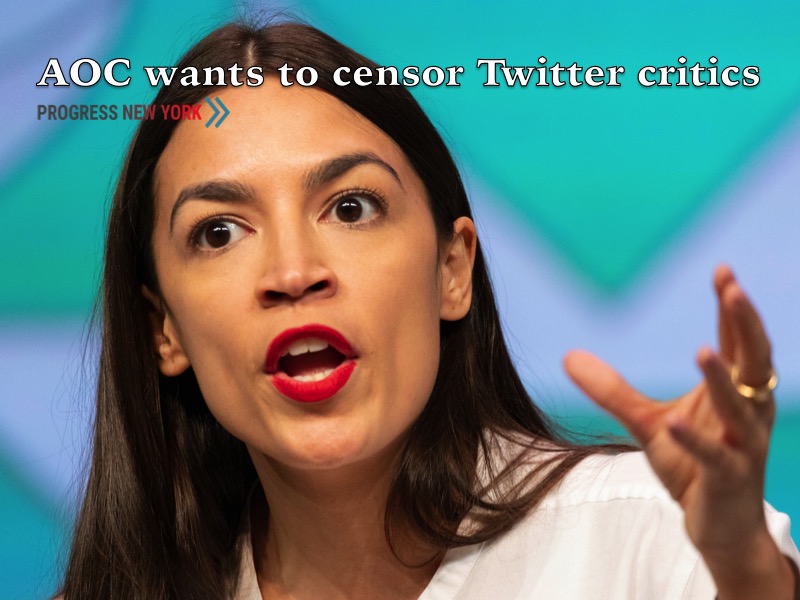U.S. Rep. Alexandria Ocasio-Cortez launched a social media war on critics, asking her supporters to flag posts on Twitter and Facebook.
By Progress New York Staff
U.S. Rep. Alexandria Ocasio-Cortez (D-NY 14) dealt a heavy-handed response to an unexpected avalanche of criticism on social media following the revelation that she was not in the U.S. Capitol Building on the day of the attempted coup d’état on Jan. 6, 2021, as many were led many to believe. On that day, political extremists attempted to use violence and intimidation to stop the certification of the Electoral College vote. During a recent Instagram Live video, U.S. Rep. Ocasio-Cortez reënacted how she believed her life was in danger during the riot and disclosed she was the survivor of a sexual assault.
After social media users posted messages, claiming that U.S. Rep. Ocasio-Cortez’s life was not in as much danger as she had described, U.S. Rep. Ocasio-Cortez’s campaign team sent a mass e-mail to her political supporters, conflating the criticism she faced online with a broader fight against “disinformation,” demanding that her followers identify critical posts, “especially those using the trending hashtag,” and asking that her followers “use the built-in report features to flag them for moderators,” according to a copy of the mass e-mail obtained by Progress New York. Twitter hashtags used by critics of U.S. Rep. Ocasio-Cortez, such as #AlexandriaOcasioSmollett and #AOCLied, trended for several days. After a social media post receives so many reports, or flags, such a post faces removal, and the author of such a post faces possible account suspension. The risks to the authors of such critical posts raised the spectre that U.S. Rep. Ocasio-Cortez supported social media censorship.
AOC’s apparent support for online censorship follows recent controversy and comes during challenging times for free speech on the Internet.
U.S. Rep. Ocasio-Cortez’s call to flag social media posts that were critical of her follow a recent, insurgent social media campaign that revealed she lacked the political courage to support the demand for a House vote for a universal healthcare bill during a pandemic. The insurgent social media campaign, labeled #ForceTheVote on Twitter and launched by the YouTube political commentator Jimmy Dore, triggered online criticism for U.S. Rep. Ocasio-Cortez and her political base, as reported by Progress New York. Some of the criticism U.S. Rep. Ocasio-Cortez faced was that she was the typical kind of politician, who betrays her campaign promises at once for political expediency. U.S. Rep. Ocasio-Cortez’s response to Mr. Dore’s criticism included what some described as an exaggeration, for example, when she compared criticism to “violence.”
But her machinations against any form of criticism have larger implications. The online monopolies of information — Web sites, like Wikipedia, YouTube, Facebook, and Twitter — receive so much traffic that they can distort news and information published by both corporate-owned, mainstream media and by independent media Web sites. Those large Web sites have also begun to interfere with the operation of mainstream and independent media, leading to accusations of censorship. For example, YouTube has long acted to suspend monetising opportunities for YouTube creators, who appear to produce content that violate the sensibilities of YouTube’s large, corporate advertisers. Twitter, for its part, has suspended the automated features of a Twitter account operated by the C’est Vrai investigative journalism tool that forms the backbone of Progress New York. The making of demands by a politician that social media content must be clean of political criticism aligns U.S. Rep. Ocasio-Cortez with former U.S. President Donald Trump (R) and Crown Prince Mohammed bin Salman of Saudi Arabia, who each turned to retaliation after they couldn’t control critical content on social media platforms.
For this report, the office of U.S. Rep. Ocasio-Cortez did not respond to an interview request.
When politicians assemble a “cult” of personality, they demand a suspension of all critical thought. That is dangerous for democratic functions of Government.
As it is, U.S. Rep. Ocasio-Cortez has faced a protest for refusing to support the pardon of Wikileaks founder and whistleblower Julian Assange, and she has come under fire for making unsubstantiated promises that her Green New Deal plan for public housing would save public housing, even though she has kept quiet about the dangers and risks to tenants facing privatisation of public housing under the de Blasio administration.
When the general public — and voters, in particular — are denied accurate or whole information to participate in a robust public debate about the issues that impact their lives and the matters of their own governance, that denial of information is described as an infringement of their Constitutional right to free speech and free assembly, for, without such information, the public is encumbered from reaching a full-range of discussions that would shape speech, participations, and actions by such individuals.
Any interference with robust public debates or the imposition of a suspension of critical thought makes worse the lack of information available to the public. The concentration of corporate-owned, mainstream media and the lack of resources at independent media leave powerful Government officials unaccountable. In New York, Gov. Andrew Cuomo (D-NY) and Mayor Bill de Blasio (D-New York City) have a history of denying records requested under Federal and State freedom of information laws, despite criticism by journalists and citizens on social media. It’s unknown if U.S. Rep. Ocasio-Cortez understands the ramifications of her opposition to any criticism on social media.

